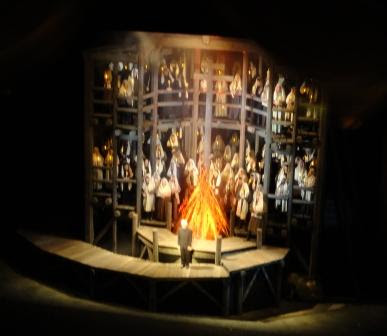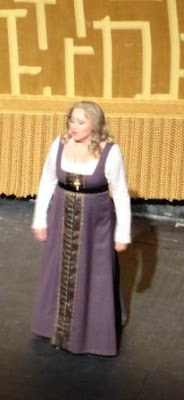(review in english below)
Khovanshchina é
uma ópera de Modest Mussorgsky com libretto incompleto do compositor,
concluído por Rimsky-Korsakov. Posteriormente foi feita uma nova versão por
Shostakovich.
As restantes personagens principais são o débil Príncipe
Andrei Khovansky, filho de Ivan, Marfa, sua antiga amante e mulher de
convicções fortes, agora membro dos Antigos Crentes, e Shaklovity, um nobre que
se opõe às ideias de Ivan Khovansky. É também importante um escrivão que está
frequentemente em cena, relatando vários episódios. A ópera termina com os
Antigos Crentes a lançarem-se e serem consumidos por uma grande pira à chegada
das forças do czar.
Apesar de o enredo ser algo complexo, a música não o é e a
obra está repleta de árias declamatórias e magistrais intervenções corais
evocativas da Rússia.
Olga Borodina, mezzo
russo, foi uma Marfa prodigiosa. O seu mezzo é de excepcional qualidade. A voz
é grave, quente e de uma potência e beleza avassaladoras. As diferentes cenas
foram interpretadas na perfeição, vocal e cenica. É uma daquelas cantoras que
nunca desilude.
****
Khovanshchina,
Metropolitan Opera, New York, March 2012
Khovanshchina is an opera by Modest Mussorgsky with libretto by the composer, who died before the conclusion what happened by the hand of Rimsky-Korsakov and later was made a new version by Shostakovich.
Khovanshchina is an opera by Modest Mussorgsky with libretto by the composer, who died before the conclusion what happened by the hand of Rimsky-Korsakov and later was made a new version by Shostakovich.
The opera is
about the spiritual and political conflicts in Russia
The other main characters are the fragile Prince Andrei Khovansky, son of Ivan, Marfa, his former lover and a woman of strong convictions, now a member of the Old Believers, and Shaklovity, a nobleman that opposes to the ideas of Ivan Khovansky. It is also important a clerk who is often on the scene, reporting several episodes. The opera ends with the Old Believers killing themselves by large fire when the forces of the Tsar arrive.
The other main characters are the fragile Prince Andrei Khovansky, son of Ivan, Marfa, his former lover and a woman of strong convictions, now a member of the Old Believers, and Shaklovity, a nobleman that opposes to the ideas of Ivan Khovansky. It is also important a clerk who is often on the scene, reporting several episodes. The opera ends with the Old Believers killing themselves by large fire when the forces of the Tsar arrive.
Although
the plot is somewhat complex, the music is not, and the opera is full of
declamatory arias and choral interventions about the fate of Russia
The staging
of August Everding was sober and
efficient, although certain scenes, such as the red square and the chapel, were
far short of what would be expected.
Musical direction of russian conductor Kirill Petrenko was of high class and imposed great fluidity to the orchestra, which responded with the usual high level. The Met chorus was excellent and their parts are numerous and spectacular.
Concerning the soloists, the Met has given us a cast of singers largely dominated by Russians and Ucranians, which was a favourable startingance, as it turned out.
Olga Borodina, Russian mezzo, was a prodigious Marfa. Her mezzo is of exceptional quality. The voice is deep, warm and of overwhelming power and beauty. The different scenes were interpreted perfectly, vocal and artistically. She's one of those singers who never disappoints.
Musical direction of russian conductor Kirill Petrenko was of high class and imposed great fluidity to the orchestra, which responded with the usual high level. The Met chorus was excellent and their parts are numerous and spectacular.
Concerning the soloists, the Met has given us a cast of singers largely dominated by Russians and Ucranians, which was a favourable startingance, as it turned out.
Olga Borodina, Russian mezzo, was a prodigious Marfa. Her mezzo is of exceptional quality. The voice is deep, warm and of overwhelming power and beauty. The different scenes were interpreted perfectly, vocal and artistically. She's one of those singers who never disappoints.
Dosifei was
Russian bass Ildar Abdrazakov. He
was remarkable, his voice is well audible, but at times he seemed to be
somewhat tense. Artistically he was also good, less static than I usually saw
him before.
Georgian baritone George Gagnidze was a sinister and threatening Shaklovity. His voice is strong, with a nice timbre, and he had striking stage presence.
Anatoli Kotscherga, Ukrainian bass, was a fabulous Prince Ivan Khovansky. His bass is strong and with unusual beauty timbre. Artistically he was excellent, always very credible in the role of the fragile and troubled prince.
Georgian baritone George Gagnidze was a sinister and threatening Shaklovity. His voice is strong, with a nice timbre, and he had striking stage presence.
Anatoli Kotscherga, Ukrainian bass, was a fabulous Prince Ivan Khovansky. His bass is strong and with unusual beauty timbre. Artistically he was excellent, always very credible in the role of the fragile and troubled prince.
The Ukrainian
tenor Misha Didyk, as Prince Andrei
Khovansky was also at the top level, both vocal and artistic.
Prince Vasily Golitsyn, played by Russian tenor Vladimir Galouzine was the less strong singer of the evening. Although we could hear him well, his voise was too nasal, which did not sound nice, and he lost quality in top notes.
Finally the excellent interpretation of the North American tenor John Easterlin as the clerk deserves a positive mention. He had a great vocal and artistic performance.
Prince Vasily Golitsyn, played by Russian tenor Vladimir Galouzine was the less strong singer of the evening. Although we could hear him well, his voise was too nasal, which did not sound nice, and he lost quality in top notes.
Finally the excellent interpretation of the North American tenor John Easterlin as the clerk deserves a positive mention. He had a great vocal and artistic performance.
****




















It sounds like an overall enjoyable performance. Just due to the nature of the plot, I would love to see it.
ResponderEliminar